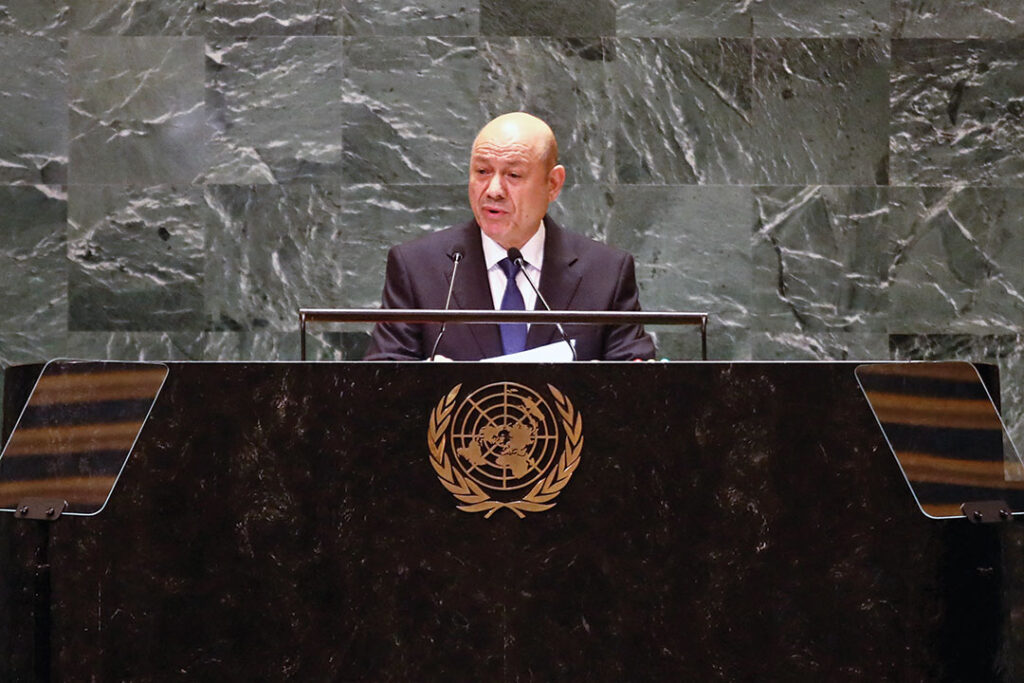The Houthi terrorist group continues to promote political and economic instability through its Iranian-backed campaign of violence and intimidation in Yemen.
Chief among the disruptions to the region are the drone and missile attacks on international shipping in the Red Sea.
“The Houthis want to blackmail the world in the Red Sea and are cloaking their acts of sabotage in misleading political justifications,” Yemeni President Dr. Rashad Mohammed al-Alimi, chairman of the Presidential Leadership Council, said in the spring of 2025.
Restraining the Houthis from threatening regional and international law and order will require a collective effort from international partners, the Yemeni president said, but he cited recent signs of a “broad national alignment” of Yemeni military formations and security units to conduct a “a battle for salvation” to dislodge the Houthi terrorists.
The Houthis’ continuation of terrorist attacks on global shipping in the Red Sea and nearby waterways is an affront to the world, the president emphasized. What was once a threat only to Yemen’s interior has expanded to threaten the flow of hundreds of billions of dollars’ worth of international trade. He called the Houthis the first rebel group in history to use ballistic missiles and drones against civilian commercial ships.
This pattern of reckless escalation in response to pleas for peace requires the international community to adopt firm policies to deter the militia from causing further harm. These efforts to stem Houthi violence have persisted since passage of U.N. Security Council Resolution 2216 in 2015. Dr. al-Alimi said the Houthis have committed gross violations of human rights, including the recent arrests of dozens of U.N. employees, adding to the thousands of innocent women, children, youth and elderly people who have disappeared in prisons for years.
Restoring political and economic stability to Yemen is not just a national issue but also is regional and global. Its stability is crucial to maintaining peace, regional security, and the right to navigation in the Red and Arabian seas and surrounding waterways, including the Suez Canal.
Yemeni stability depends upon banning the flow of Iranian weapons and eradicating sources of funding that have prolonged the conflict. Until that is done, the Houthis have little incentive to cease blackmailing the international community and start negotiating a comprehensive and just peace, the Yemeni president said.
With the backing of the United Nations, the legitimate government offered concessions to encourage the Houthis to participate in peace negotiations. They were rebuffed.
“The militias responded by hijacking three Yemeni Airlines planes, attacking the Safer oil facility in Marib Governorate with drones, and issuing racist laws and regulations to focus public office on a special category of its loyal militants, most notably the judiciary, which portends more repressive measures,” Dr. al-Alimi said.
The peace process includes supporting the efforts of moderate forces in the region led by the Kingdom of Saudi Arabia, which, with partners in the Coalition to Support Legitimacy in Yemen, have borne the responsibility of defending international resolutions, extending a helping hand and opening their doors to victims of the conflict.
“Without the Saudi-led coalition, the Houthis and Iran would have taken over control of all of Yemen — all the way to the border with Oman,” the Yemeni president said. “With the help of the coalition, we were able to liberate 70 percent of the territory.” Sources: Der Spiegel and Asharq Al-Awsat

